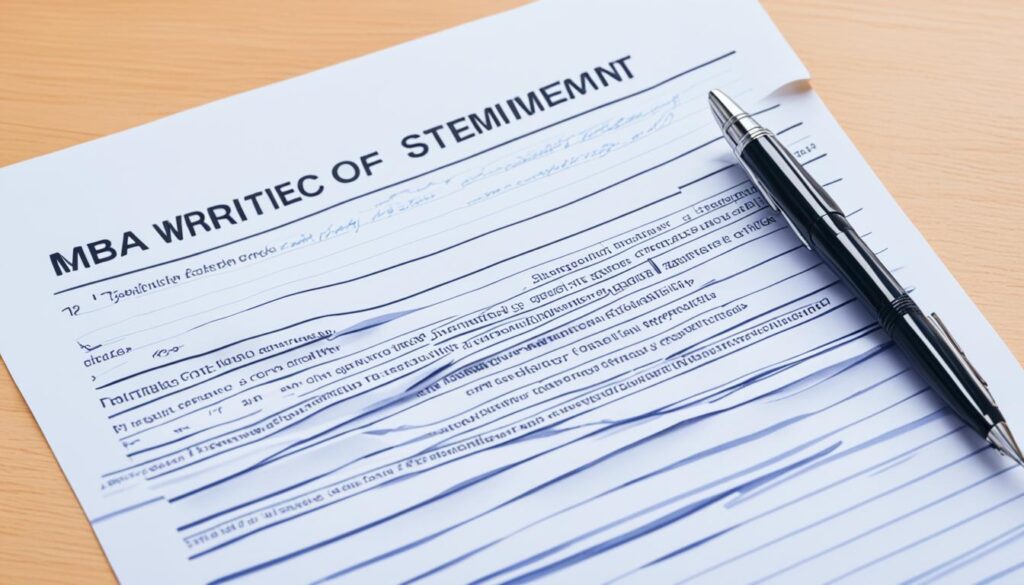Did you know over 400,000 students apply to MBA programs in the U.S. each year? With so many applicants, it’s key to know what top MBA programs want. This includes things like test scores, academic records, work history, and personal statements. This article will cover all you need to know to boost your chances of getting into a top business school.
Key Takeaways
- Understand the importance of standardized test scores like the GMAT or GRE in MBA admissions.
- Recognize the significance of strong academic transcripts and a proven track record of success in your studies.
- Learn how to showcase your professional work experience and leadership skills to stand out.
- Discover the art of crafting a compelling personal statement that highlights your unique qualifications.
- Familiarize yourself with the common application deadlines and interview processes for MBA programs.
Understanding the Essentials of MBA Applications
Getting an MBA degree is a big step that needs a strong application. At the heart of this are academic transcripts and standardized test scores. Business schools look closely at these to see if you’re smart enough and ready for graduate-level studies.
Transcripts and Standardized Test Scores
Your undergraduate transcripts show your past academic success. Admissions teams check your grades for a steady record of good work. They want students who can do well in tough classes.
Most MBA programs also want a score from tests like the GMAT (Graduate Management Admission Test) or the GRE (Graduate Record Examination). These tests show your skills in math, writing, and solving problems. These skills are key for doing well in business school.
Professional Work Experience
Relevant work experience is also key for a good MBA application. Business schools like candidates who have shown they can do well in the job world. They look for people who lead, solve problems, and work well under pressure.
Admissions teams will look at your job history. They want to see how you’ve grown, how you handle tough challenges, and how you can add to class discussions and projects.
“The MBA program is designed to transform ambitious individuals into strategic leaders. Your academic record and professional experience are the foundation upon which you can build your future success.”
MBA admission requirements: The Key Components
When applying for an MBA program, you need more than just your transcripts and test scores. You also need to show your professional work experience. Plus, you must meet other important criteria to stand out.
Getting letters of recommendation from people who know you well is key. They should talk about your leadership skills, how well you’ll do in school, and if you’re a good fit for the MBA program. These letters give the admissions team a deeper look at you.
Your statement of purpose or personal essay is also vital. Here, you share your unique experiences, career goals, and why you love the program. Answering essay questions well can make you stand out and show you’re a good match.
Don’t forget about admissions interviews. This is your chance to show off your communication skills and explain why you’re perfect for the MBA program rankings. Remember, missing the application deadlines can hurt your chances.
By understanding and handling these key parts well, you can boost your chances of getting into your top-choice program.
“The MBA admissions process is a complex task that needs careful planning and action. Those who can show their unique strengths and fit for the program are more likely to be noticed in a crowded field.”

Crafting a Compelling Personal Statement
The personal statement is key in the MBA application. It lets you share your story, show off your achievements, and prove you’re a good fit for the program. Focus on your leadership, problem-solving skills, and passion for your field.
Highlighting Your Achievements
Your statement should focus on your biggest wins, both in your personal and work life. This might be leadership roles, awards, or experiences that changed your career. Showing these achievements lets the committee see your skills and potential.
Demonstrating a Fit for the Program
It’s also vital to show how you match the program’s mission and values. Do your homework on the school and explain how your goals and background fit with the program. Be ready to talk about this in interviews, showing your excitement for the program.
With a strong personal statement that highlights your achievements and fit, you’ll stand out. This can help you get into the program you want.

“Your personal statement is your chance to let the admissions committee get to know you as an individual. Seize this opportunity to make a lasting impression.”
Conclusion
The MBA admission process might seem tough, but knowing the key requirements helps. You can make an application that shows off your special skills. Focus on your school achievements, work experience, and personal traits. This shows you’re ready for a tough business program.
When looking at the mba admission requirements, put together a portfolio that shows your best points. This means keeping a good GPA, scoring well on tests, and showing your leadership and teamwork skills. Paying close attention to details and planning can really boost your chances of getting in.
The application is your chance to show who you really are. Stay organized, meet deadlines, and think carefully about each part. Doing this can help you get into a top business school. It’s a big step towards your career goals.